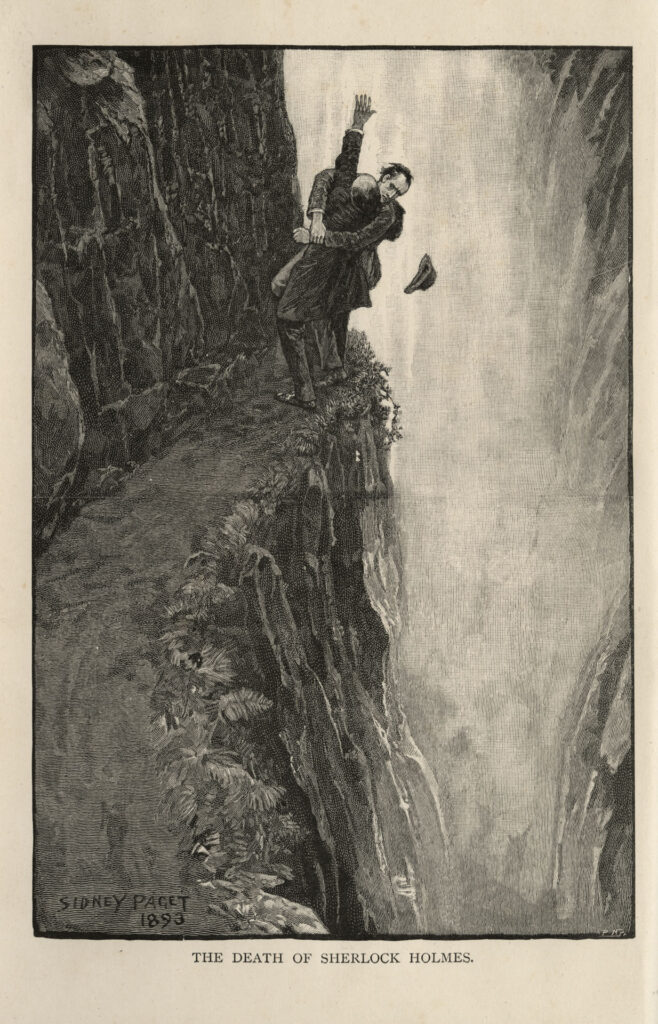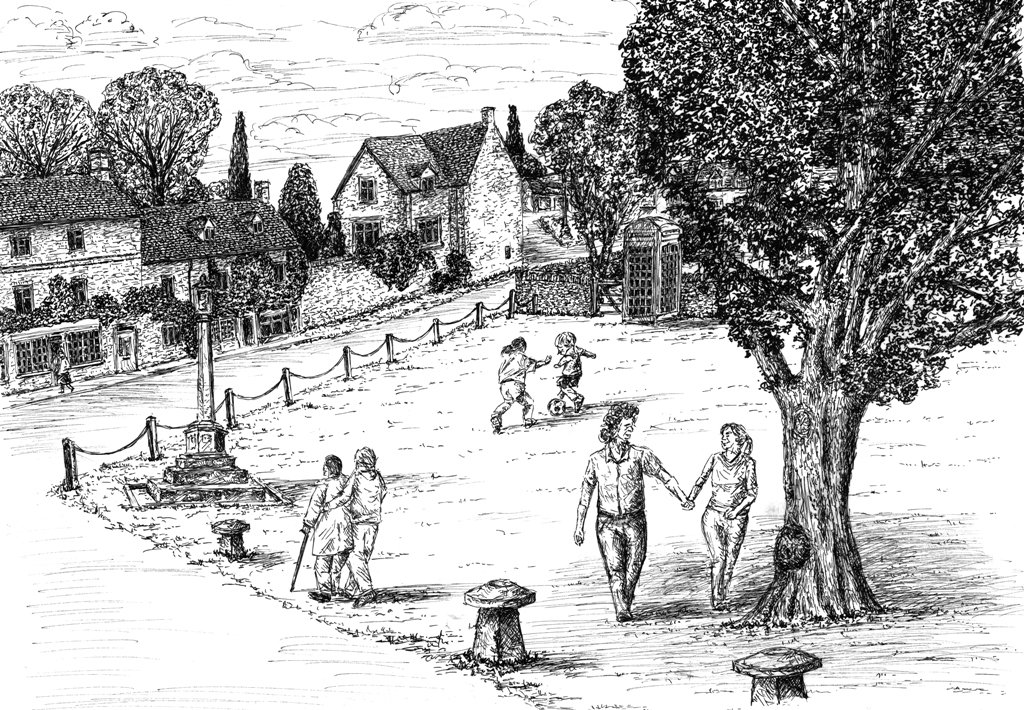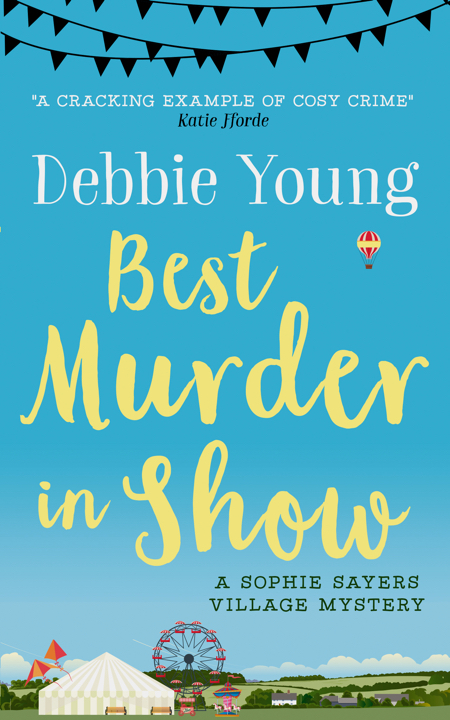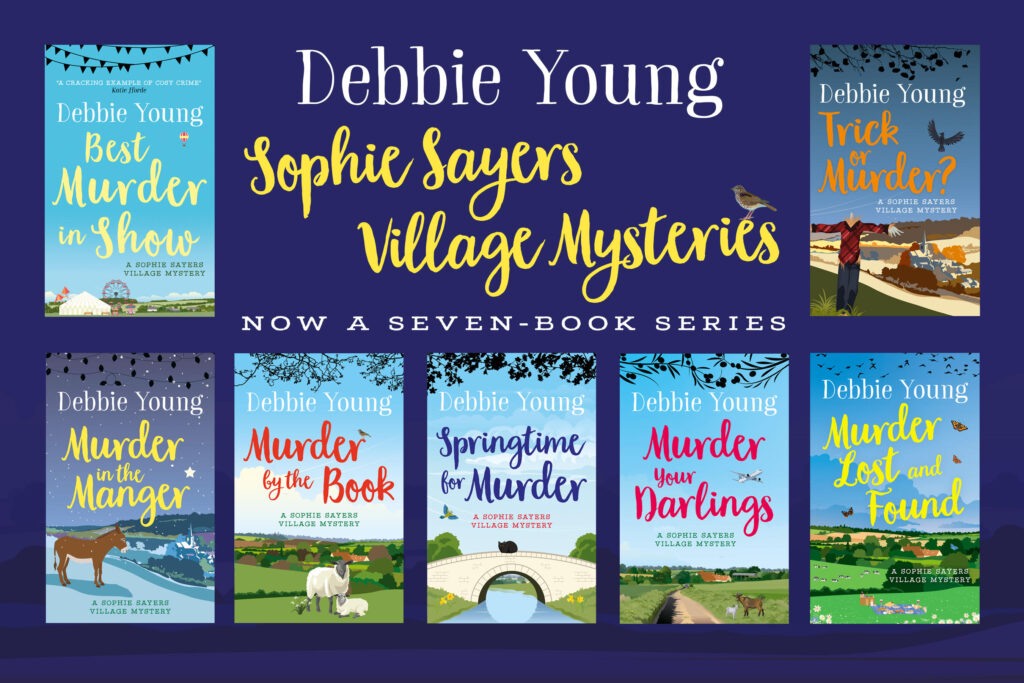I’m delighted to welcome Debbie Young back to the blog. When I worked it out, I realised we’d known each other for over ten years!
Debbie is the author of nine hilarious, heartwarming mystery novels, two of which were shortlisted for the Selfies Award for Best Independently-published Adult Fiction in the UK (2020 and 2021). She is also a course tutor for Jericho Writers, UK Ambassador for the Alliance of Independent Authors, and the author of various guidebooks and blog posts for authors.
Her fiction is inspired by life in the Cotswold village of Hawkesbury Upton, where she has lived for the last thirty years and by the girls’ boarding school where she worked for thirteen years. She writes in a wooden hut built by her Scottish husband at the bottom of the garden, which she likes to think of as her Little House in the Big Woods, though with fewer bears and a more dependable supply of coffee.
Over to Debbie who is serious about series!
Like most avid readers, I love to discover a good series of books, knowing that each new title I pick up will transport me to familiar territory in the company of characters who feel like old friends (Carina and Aurelia Mitela, I’m looking at you) – or indeed enemies in case of the characters one loves to hate (boo to you, Mr Renschman!). It’s like relaxing in your holiday home rather than exploring new destinations, and in my view, there’s plenty of time for both.
So at the start of my career as a novelist, it was second nature to plan to write not just a novel, Best Murder in Show, but a series of seven – yes, seven! – books. It’s so much easier to revisit a world I’d already created than to have to build new foundations for every book.
Readers and writers aren’t the only ones who loves series – publishers do too. As with any commodity, it’s easier to sell a new variant of an established, popular product (strawberries-and-cream KitKat, anyone?) than to flog a whole new concept. (What a bold innovation the Curly Wurly was!)
Of course, not all stories lend themselves to series. If a character’s growth and development is completed, resurrecting them beyond “The End” may prove dull. However, in the kind of series that depends purely on action, and in which the characters remain unchanged from start to finish, a series may go on indefinitely. (“The name’s Bond, James Bond…”)
Should a great series therefore never end, or is it better to always leave readers wanting more? Certainly each story should end with closure rather than a cliffhanger. Personally, I’m wary of series that go on for too long. They can lose their edge and their originality. One of my favourite fiction series, which I shan’t name out of respect for the late author, became so contrived after the twelfth book that I stopped reading. I sensed the author also felt it had run its course but was obliged to keep going for her publisher’s sake. Publishers never like to retire golden-egg-laying geese and generally demand a new book each in year in a bestselling series.
One might assume that indie authors like Alison Morton and I might feel under less pressure and therefore publish at their leisure. In my experience, the opposite is true. Without a trade publisher as middleman, we have a very close connection with our readers. As I’m sure is also true for Alison, as soon as I release a new book, readers start asking when the next one will be out. There may be no let-up, but, frankly, it’s a good problem to have, knowing that readers are so enjoying your work.(Too true – Alison)
We have both also both launched additional series, adding to our workloads, Alison’s a new contemporary thriller series kicking off with the gripping Double Identity. After the fifth Sophie Sayers book, I started a second series of novels, then a third of novelettes. This tactic helped to keep my first series fresh.

Sherlock Holmes and Professor Moriarty at the Reichenbach Falls, Sidney Paget, The Strand Magazine, December, 1893 (Public domain via Wikimedia)
Too many authors end up resenting their leading characters. I didn’t want that to fall into the same trap as Sir Arthur Conan Doyle, who, weary of Sherlock Holmes and desperate to write in other genres, sent his consulting detective on a one-way trip to the Reichenbach Falls, only to have to resuscitate him a few years later for further adventures.
Hats off to Lee Child, who found a different way of escaping from the demands of his protagonist after a 25-year run of annually-published novels. Rather than retiring Jack Reacher, he retired himself, delegating future Reacher novels to his brother, already an author in his own right.
Twenty-five novels – that’s a LOT of books. But how many is too many? And how many books constitutes a series in the first place? Technically, any book with a sequel is a series (a duology), but many authors like to write a trilogy or more. The reason I chose seven for my Sophie Sayers Village Mystery series is that I wanted to chronicle Sophie’s first year in her adopted Cotswold village and needed that many to accommodate the many events of the typical rural year, from one summer to the next.
I’m also a fan of putting an upper limit on a series of novels so that it doesn’t lose its bite, something that is demonstrable in television series. Compare the brilliance of the twelve episodes of “Fawlty Towers”, for example, with the 295 of “Last of the Summer Wine” – apparently an endlessly replenishing bottle of summer wine, like the magic pint of Guinness in the old joke, until the BBC finally pulled the plug after Season 31.

“Wendlebury Barrow” © T E Shepherd www.teshepherdart.com
However, I always give the last call to my readers: in response to their protests that Murder Lost and Found should be the final book about Sophie Sayers, I’m now planning an eighth (and final? – the jury is still out!) novel. Sophie also features in my Tales from Wendlebury Barrow series of novelettes, and even puts in a guest appearance in my novels set at St Bride’s School. The eccentric girls’ boarding school of the title is just down the road from Sophie’s village of Wendlebury Barrow. One canny reader even suggested that Sophie join forces with Gemma, the central character at St Bride’s, to solve a mystery together. Clearly there’s more ways than one to keep a series spinning.
My final piece of advice is for readers: if a favourite author sidesteps from your favourite series, follow her and give the new series a chance, even if it’s in a completely different genre. You never know, it could be the start of a whole new addiction.
Words of truth – thank you, Debbie I can’t wait for your next story!
––––––––––
Connect with Debbie
Website: www.authordebbieyoung.com
Twitter: www.twitter.com/DebbieYoungBN
Facebook: www.facebook.com/AuthorDebbieYoung
Instagram: www.instagram.com/DebbieYoungAuthor
––––––––––
Read the first of Debbie’s Sophie Sayers mysteries
 A dead body on a carnival float at the village show
A dead body on a carnival float at the village show
A clear case of murder in plain sight, thinks new arrival Sophie Sayers – but why do none of the villagers agree? What dark secrets are they hiding to prevent her unmasking the murderer, and who holds the key to the mystery?
– Hector, the gorgeous but enigmatic owner of the village bookshop
– Joshua, the intrusive yet insightful old man from next door
– Carol, village shopkeeper, the fount of village gossip, not all of it reliable
And what is that mysterious ingredient that almost knocks Sophie out when she takes tea at the village bookshop? (Not the best way to start a job interview.)
Can Sophie unearth the clues tucked away in this outwardly idyllic Cotswold village before anyone else comes to harm, not least herself?
For fans of classic cozy mysteries everywhere, Best Murder in Show will make you laugh out loud at the idiosyncrasies of English country life, and rack your brains to discover the murderer before Sophie can.
Buy this book here
Ebook: https://books2read.com/u/31ryJr
Paperback: https://viewbook.at/BMIS
Alison Morton is the author of Roma Nova thrillers – INCEPTIO, CARINA (novella), PERFIDITAS, SUCCESSIO, AURELIA, NEXUS (novella), INSURRECTIO and RETALIO, and ROMA NOVA EXTRA, a collection of short stories. Audiobooks are available for four of the series. Double Identity, a contemporary conspiracy, starts a new series of thrillers.
Find out more about Roma Nova, its origins, stories and heroines and taste world the latest contemporary thriller Double Identity… Download ‘Welcome to Alison Morton’s Thriller Worlds’, a FREE eBook, as a thank you gift when you sign up to Alison’s monthly email newsletter. You’ll also be among the first to know about news and book progress before everybody else, and take part in giveaways.















Leave a Reply